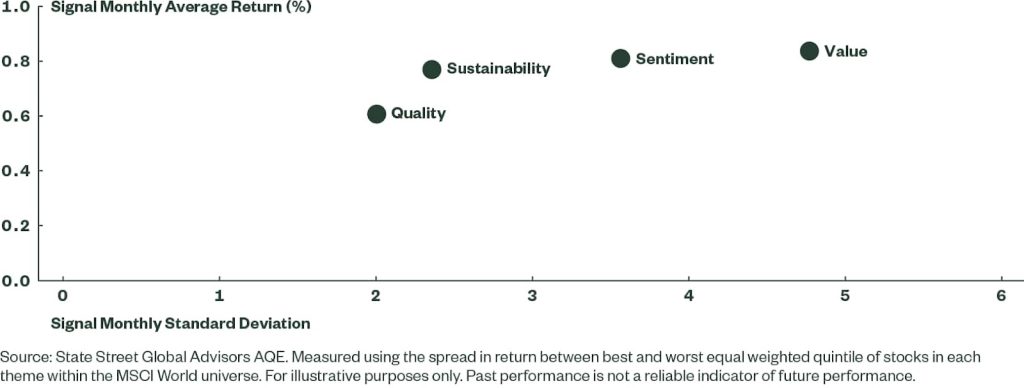By: Olivia Engel, CFA, CIO, Active Quantitative Equity, SSGA
When AQE evaluates companies on one of the core themes1 that we deem most important — Quality — environmental, social, and governance (ESG) characteristics form a part of our evaluation. This is because we believe that select ESG characteristics can be considered a proxy for long-term forward planning and thinking in companies, and can signal a different kind of resilience from that which is found on financial statements.
We create sustainability scores for the companies we are evaluating and use those scores to complement our other Quality metrics, which in many (but not all) cases are gleaned from financial data. When tracked as a standalone signal, sustainability has delivered strong results over the last three years. In fact, when compared with our core themes (Value, Sentiment, and Quality), sustainability delivered returns almost as high as sentiment and value, but with lower volatility, and delivered a higher return than quality. See chart below.
Three-Year Returns and Volatility, by Signal, as of October 31, 2022

This post first appeared on January 6th, 2023 on the State Street Global Advisors’ blog
PHOTO CREDIT: https://www.shutterstock.com/g/vovan13
Via SHUTTERSTOCK
Footnotes
1 Value, Quality, and Sentiment are the core themes we deem most important.
Disclosure
Marketing communication
State Street Global Advisors Worldwide Entities
The whole or any part of this work may not be reproduced, copied or transmitted or any of its contents disclosed to third parties without SSGA’s express written consent.
A “quality” style of investing emphasizes companies with high returns, stable earnings, and low financial leverage. This style of investing is subject to the risk that the past performance of these companies does not continue or that the returns on “quality” equity securities are less than returns on other styles of investing or the overall stock market.
The value style of investing that emphasizes undervalued companies with characteristics for improved valuations, which may never improve and may actually have lower returns than other styles of investing or the overall stock market.
Equity securities may fluctuate in value and can decline significantly in response to the activities of individual companies and general market and economic conditions.
The views expressed are the views of Active Quantitative Equity through December 1, 2022, and are subject to change based on market and other conditions. This document contains certain statements that may be deemed forward-looking statements. Please note that any such statements are not guarantees of any future performance and actual results or developments may differ materially from those projected.
Investing involves risk including the risk of loss of principal.
SSGA uses quantitative models in an effort to enhance returns and manage risk. While SSGA expects these models to perform as expected, deviation between the forecasts and the actual events can result in either no advantage or in results opposite to those desired by SSGA. In particular, these models may draw from unique historical data that may not predict future trades or market performance adequately. There can be no assurance that the models will behave as expected in all market conditions. In addition, computer programming used to create quantitative models, or the data on which such models operate, might contain one or more errors. Such errors might never be detected, or might be detected only after the Portfolio has sustained a loss (or reduced performance) related to such errors. Availability of third-party models could be reduced or eliminated in the future.
The returns on a portfolio of securities which exclude companies that do not meet the portfolio’s specified ESG criteria may trail the returns on a portfolio of securities which include such companies. A portfolio’s ESG criteria may result in the portfolio investing in industry sectors or securities which underperform the market as a whole.
Investing in foreign domiciled securities may involve risk of capital loss from unfavorable fluctuation in currency values, withholding taxes, from differences in generally accepted accounting principles or from economic or political instability in other nations. Investments in emerging or developing markets may be more volatile and less liquid than investing in developed markets and may involve exposure to economic structures that are generally less diverse and mature and to political systems which have less stability than those of more developed countries.



